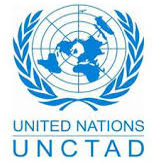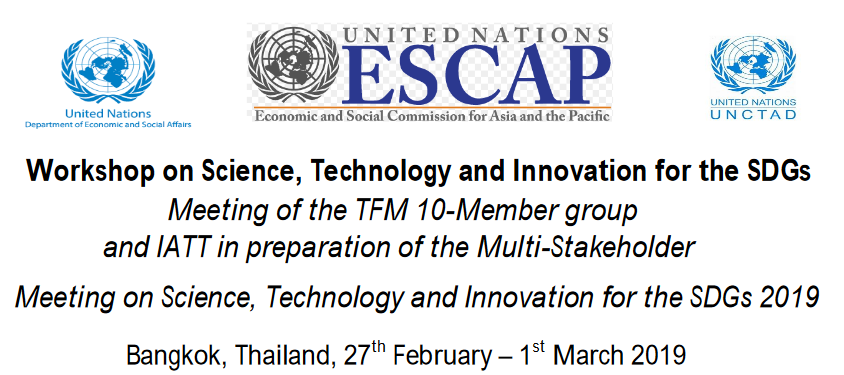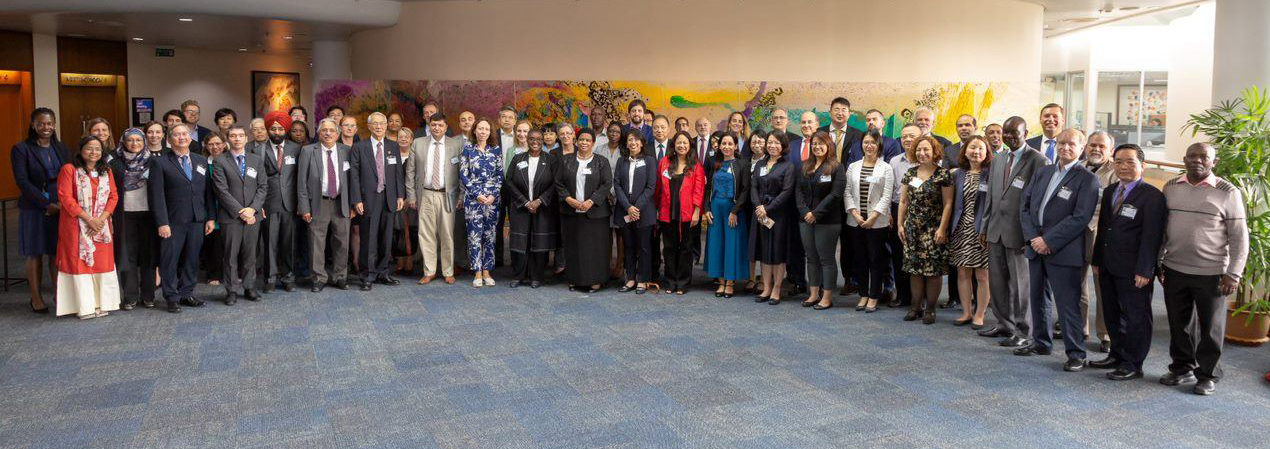

The United Nations Department of Economic and Social Affairs (DESA), in collaboration with United Nations Economic and Social Commission for Asia and the Pacific (UNESCAP) and United Nations Conference on Trade and Development (UNCTAD) organized the Workshop on Science, Technology and Innovation (STI) for the achievement of the Sustainable Development Goals (SDGs) as a preparatory event for the 2019 STI Forum, as well as to collect inputs for the development of the Online Platform – a component of the Technology Facilitation Mechanism (TFM). The Workshop was held at United Nations Conference Centre (UNCC), ESCAP, Bangkok, Thailand.
The objective of the Workshop was to contribute to the preparations of the STI Forum 2019 by mobilizing all stakeholders to share information on trends in the deployment of science, technology and innovation for the SDGs 4 – Quality education, 8 – Economic growth, 10 – Reduce inequalities, 13 – Climate action, 16 – Peace and justice, including specific solutions and achievements, state of the art expertise on specific issues and practice areas, emerging priorities, critical knowledge and innovation gaps, as well as their views on ways of mobilizing science, technology and innovation responses to address these gaps. The Workshop also aimed at collecting inputs for the development of the TFM Online Platform.
The full report of the workshop is available in this page and the presentations are available in the workshop webpage.

Summary of Discussions
- Session 2a: STI for ensuring inclusive and equitable quality education and promote lifelong learning opportunities for all (SDG 4)
- Session 2b : STI for Promote peaceful and inclusive societies for sustainable development, provide access to justice for all and build effective, accountable and inclusive institutions at all levels (SDG 16)
- Session 2c: STI for promoting sustained, inclusive and sustainable economic growth, full and productive employment and decent work for all (SDG 8)
- Session 2d: STI for taking action to combat climate change and its impacts. (SDG 13)
- Session 2e: STI for reducing inequality within and among countries (SDG 10)
- Session 3: Promoting synergies with indigenous knowledge for the achievement of the SDGs
- Session 4: Emerging technology clusters and the impact of rapid technology change on the SDGs
- Session 5: Taking stock and lessons-learnt from the start-up phase of the TFM since 2015
- Session 6: STI roadmaps incorporating SDGs and their implications for policy and capacity building
- Session 7: Gender and STI for SDGs
Gong Ke, WFEO President-Elect and President of Nankai University, was a panelist on the workshop.
He made the presentation “Promoting Responsible AI innovation for Sustainable Development” on Session 4 and the presentation “Strengthening the Role of Engineering for SDG” on Session 5
Key Recommendations
The following conclusions and recommendations emerged from the discussions:
- STI Forum 2019 could be structured similar to the successful format of 2018. It will thus include sessions on the SDGs under review at HLPF 2019 (SDGs 4, 8, 10, 13, 16), discussion of their interlinkages, and some other cross-cutting themes including: local and indigenous knowledge; emerging and exponential technologies and their impacts on the SDGs; STI roadmaps for the SDGs, gender issues and capacity building; and the TFM online platform. These sessions would be complemented by a coherent series of
special panels, side events, exhibitions and demonstrations of solutions. - The present Workshop collected a wealth of facts, challenges, lesson-learnt, solutions, and initial ideas for structure, participation, format and potential substantive outcomes of the various sessions at the STI Forum 2019, as they are expected to closely correspond to the sessions at the present Workshop. It was suggested to use the wealth of material summarized below and presented to the Workshop for the purpose of preparing in-depth substantive background notes for the Forum.
- Members of the 10-Member Group and of the IATT, as well as participating experts expressed their willingness to continue working together in support of the TFM in general and the STI Forum in particular, regardless of potential changes in membership in the future.
- The STI Forum process will continue to work cumulatively, building on the summaries of co-chairs of previous Forums. Similarly, the present Workshop and previous meetings and activities under the TFM will continue to aim working cumulatively, building on each other and spurring joint action and partnerships.
For more information:
Workshop on Science, Technology and Innovation for the SDGs full report
Workshop on Science, Technology and Innovation for the SDGs webpage
“Promoting Responsible AI innovation for Sustainable Development” presentation by Prof. Gong Ke during Session 4
“Strengthening the Role of Engineering for SDG” presentation by Prof. Gong Ke, during Session 5
STI Forum 2019 Presentation
APR
2019

